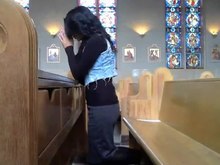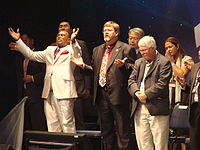PRAYER
Prayer
In the first blog i said we shall be discussing about how to pray and 7 revelation of prayer Firstly what is Prayer
What is Prayer?
So what is prayer? Prayer is a relationship, wherein we humbly communicate, worship, and sincerely seek God's face, knowing that He hears us, loves us and will respond, though not always in a manner we may expect or desire. Prayer can encompass confession, praise, adoration, supplication, intercession and more.In addition, our attitude in prayer is important. We must not be haughty, but humble (Ephesians 4:2; James 4:10; 1 Peter 5:6, etc.). Seen in this light, to "pray continually" (1 Thessalonians 5:17) means, in one sense, that we must always strive to have a prayerful attitude. Our prayers must come often and regularly, not from legalistic duty, but from a humble heart, realizing our dependence on God in every aspect of our lives.
"Hear my prayer, O LORD, listen to my cry for help." –Psalm 39:12 (NIV)
"Lord, teach us to pray." –Luke 11:1
"After Jesus said this, He looked toward heaven and prayed." –John 17:1
"They all joined together constantly in prayer." –Acts 1:14
"And pray in the Spirit on all occasions with all kinds of prayers and requests." –Ephesians 6:18
"Pray continually." -1 Thessalonians 5:17
Throughout the Bible, believers are called to pray. But what is prayer? What does it mean to "pray without ceasing?" And does prayer really make a difference? Before delving too deeply into the topic of prayer, it will be beneficial to first define the term, as well as the focus of our prayers—God.
Prayer and God's Nature
Let's start with the second part. In order to develop a clear idea of prayer, we must first have a clear idea of God. Biblically speaking, God is a personal being. This is critical to prayer because it means that God is a person we can interact with, that He has a will and that we are able to relate to Him on a meaningful level. If He were impersonal, then prayer would not be meaningful. If He were personal, but uncaring and distant, prayer wouldn't serve a purpose.Not only is God personal, He is also loving (1 John 4:8, 16; John 3:16). This is also important in relation to prayer. If God were personal, but uncaring or unkind, then prayer might do us more harm than good! But God is not only loving, He is all loving (omnibenevolent). In relation to prayer, this means that God always desires the best for us because He loves us.
God is also all powerful (omnipotent), meaning that no prayer is beyond His ability to answer, "For nothing is impossible with God" (Luke 1:37). If God were less than all powerful, then we would have no assurance that He could answer or even hear our prayers.
The fact that God is all-knowing (omniscient) is also significant to the concept of prayer. If God were limited, then He would not know all that is happening in His creation. If this were the case, He might overlook our prayers because they might be beyond His knowledge. Fortunately, the Bible is clear that God knows everything (see, for instance, Psalm 139:2-4; 147: 4-5; Isaiah 46:10). In relation to God's omniscience, Jesus said, "Your Father knows what you need before you ask him" (Matthew 6:8).
God is also wise and holy. He knows what is best for us, as well as what will lead us to holiness rather than sin. He is also immanent, meaning that God is active in His creation in a personal way, not only directing greater matters of history, but also involved in the life of everyone. This means that no prayer is too great for Him, but also that no prayer is too small for Him.
While we cannot explore all of God's attributes here, one final one to note, of utmost importance to prayer is God's sovereignty. God is supremely in charge of everything that happens in His universe. Nothing takes Him by surprise and nothing happens in our lives without the knowledge of God, even though we may not always understand His actions: "'For my thoughts are not your thoughts, neither are your ways my ways,' declares the LORD. 'As the heavens are higher than the earth, so are my ways higher than your ways and my thoughts than your thoughts'" (Isaiah 55:8-9).
In hearing and responding to our prayers, then, we are assured that God will do so on the basis of His many attributes. His personal nature, love, power, knowledge, wisdom, holiness, immanence and sovereignty all play a role in how we relate to God in prayer and how He relates to us.
What Prayer Is Not
Now that we have a clearer understanding of God's nature, it may be tempting to delve right into a definition of prayer. But first let's take a brief look at what prayer is not (this is by no means an exhaustive list):- Prayer is not magic. We cannot summon God as though He were a genie, waiting to grant our wishes without regard for our circumstances or the consequences.
- Prayer does not make demands. While we can make requests of God in prayer, we dare not make demands. God is the Creator of the universe and does not take orders from us.
- Prayer is for our benefit, not God's. We need a relationship with God, available to us through Jesus Christ and engaged primarily through prayer, because we were made to function best when we are in a proper relationship with our Creator.
- Prayer is not a guarantee against suffering. "In this world you will have trouble" (John 16:33); "Dear friends, do not be surprised at the painful trial you are suffering, as though something strange were happening to you. But rejoice that you participate in the sufferings of Christ, so that you may be overjoyed when his glory is revealed" (1 Peter 4:12-13).
- Prayer is not an opportunity for us to show off. "And when you pray, do not be like the hypocrites, for they love to pray standing in the synagogues and on the street corners to be seen by men" (Matthew 6:5).
Praying Hands by
Prayer can be a form of religious practice, may be either individual or communal and take place in public or in private. It may involve the use of words, song or complete silence. When language is used, prayer may take the form of a hymn, incantation, formal creedal statement, or a spontaneous utterance in the praying person. There are different forms of prayer such as petitionary prayer, prayers of supplication, thanksgiving, and praise. Prayer may be directed towards a deity, spirit, deceased person, or lofty idea, for the purpose of worshipping, requesting guidance, requesting assistance, confessing transgressions (sins) or to express one's thoughts and emotions. Thus, people pray for many reasons such as personal benefit, asking for divine grace, spiritual connection, or for the sake of others.
Some anthropologists believe that the earliest intelligent modern humans practiced a form of prayer. Today, most major religions involve prayer in one way or another; some ritualize the act of prayer, requiring a strict sequence of actions or placing a restriction on who is permitted to pray, while others teach that prayer may be practiced spontaneously by anyone at any time.
Scientific studies regarding the use of prayer have mostly concentrated on its effect on the healing of sick or injured people. Meta-studies of the studies in this field have been performed showing evidence only for no effect or a potentially small effect. For instance, a 2006 meta analysis on 14 studies concluded that there is "no discernable effect" while a 2007 systemic review of studies on intercessory prayer reported inconclusive results, noting that 7 of 17 studies had "small, but significant, effect sizes" but the review noted that the most methodologically rigorous studies failed to produce significant findings. Some studies have indicated increased medical complications in groups receiving prayer over those without.The efficacy of petition in prayer for physical healing to a deity has been evaluated in numerous other studies, with contradictory results. There has been some criticism of the way the studies were conducted.
Act of prayer
Video demonstration of prayer
Various spiritual traditions offer a wide variety of devotional acts. There are morning and evening prayers, graces said over meals, and reverent physical gestures. Some Christians bow their heads and fold their hands. Some Native Americans regard dancing as a form of prayer. Some Sufis whirl. Hindus chant mantras.[15] Jewish prayer may involve swaying back and forth and bowing. Muslims practice salat (kneeling and prostration) in their prayers. Quakers keep silent. Some pray according to standardized rituals and liturgies, while others prefer extemporaneous prayers. Still others combine the two.
Friedrich Heiler is often cited in Christian circles for his systematic Typology of Prayer which lists six types of prayer: primitive, ritual, Greek cultural, philosophical, mystical, and prophetic. Some forms of prayer require a prior ritualistic form of cleansing or purification such as in ghusl and wudhu.
Prayer may be done privately and individually, or it may be done corporately in the presence of fellow believers. Prayer can be incorporated into a daily "thought life", in which one is in constant communication with a god. Some people pray throughout all that is happening during the day and seek guidance as the day progresses. This is actually regarded as a requirement in several Christian denominations, although enforcement is not possible nor desirable. There can be many different answers to prayer, just as there are many ways to interpret an answer to a question, if there in fact comes an answer. Some may experience audible, physical, or mental epiphanies. If indeed an answer comes, the time and place it comes is considered random. Some outward acts that sometimes accompany prayer are: anointing with oil; ringing a bell;burning incense or paper; lighting a candle or candles; See, for example, facing a specific direction (i.e. towards Mecca or the East); making the sign of the cross. One less noticeable act related to prayer is fasting.
A variety of body postures may be assumed, often with specific meaning (mainly respect or adoration) associated with them: standing; sitting; kneeling; prostrate on the floor; eyes opened; eyes closed; hands folded or clasped; hands upraised; holding hands with others; a laying on of hands and others. Prayers may be recited from memory, read from a book of prayers, or composed spontaneously as they are prayed. They may be said, chanted, or sung. They may be with musical accompaniment or not. There may be a time of outward silence while prayers are offered mentally. Often, there are prayers to fit specific occasions, such as the blessing of a meal, the birth or death of a loved one, other significant events in the life of a believer, or days of the year that have special religious significance.
PRAYER
![PRAYER]() Reviewed by Imafidon Samuel Jr.
on
02:53
Rating:
Reviewed by Imafidon Samuel Jr.
on
02:53
Rating:













No comments: